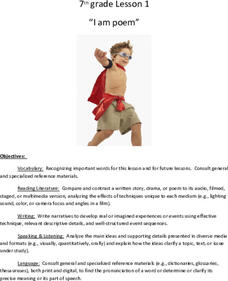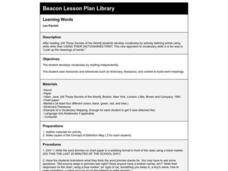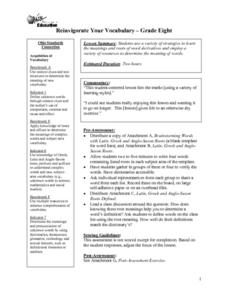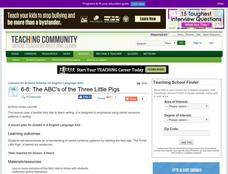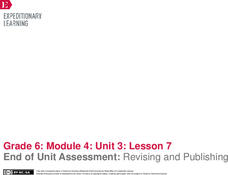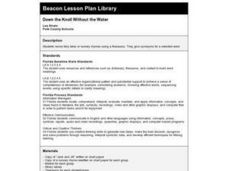Curated OER
Dragonwings: Evaluate Chapters 10-12
As your class finishes the novel Dragonwings, use these culminating projects. A vocabulary list is given for chapters eleven and twelve and either an epitaph or letter activity concludes the book. The final project consists of creating a...
Curated OER
Word Reference Materials
A class discussion on reference materials opens up a activity on how to use these important resources. They discover that dictionaries, glossaries, and thesauruses are called word reference resources, and they practice using them. The...
Curated OER
Reference Source Four Square
Fourth graders play a four-square game on the playground while reviewing four main references -- dictionary, atlas, thesaurus, and encyclopedia. Students must throw the playground ball in the correct "square" identifying the correct...
Curated OER
Homophones and Vivid Verbs
Students define and practice using synonyms, antonyms, homonyms, and homophones in complete sentences, paragraphs and essays. They include "vivid verbs" in their writing with the aid of a dictionary or thesaurus.
Curated OER
"Spelldown" by Becky Mushko
Learners read Spelldown, by Becky Mushko and consider how it portrays the Appalachian community. They define and discuss vocabulary presented in the story and write a comparison/contrast paper analyzing two of the story's characters. The...
Utah Education Network (UEN)
7th Grade Poetry: I Am Poem
A study of Alfred Noyes's poem "The Highwayman" opens a lesson about narrative poetry. Scholars read the poem and compare it to the animated video version using a worksheet. Learners look at models and use a template to craft an "I Am"...
Curated OER
Reference Materials
Students discuss reasons to use reference materials, identify correct reference material to use for specific information, find answers to specific questions by locating information in encyclopedia, dictionary, atlas, almanac, glossary,...
Curated OER
Learning Words
Students listen to Jane Yolen's, All Those Secrets of the World. They engage in activities to find word meanings without using a dictionary. They practice using a vocabulary mapping handout.
Curated OER
Nouns in a Story
Students, assessing a variety of formatting tools with Microsoft Word, utilize a bank of vocabulary words to make a personal dictionary of nouns. They classify nouns for people, places, things and ideas and separate them into common and...
Curated OER
New Hampshire Unplugged
Young historians explore how technology and science affected life in the state of New Hampshire. They define technology and give personal experiences of how technology affects people and how people have used technology. They compare the...
Curated OER
Reinvigorate Your Vocabulary
Eighth graders participate in a variety of activities to examine the meanings and roots of word derivatives and the meanings of words. Using context clues, they determine the meanings of words omitted from a passage and complete a prefix...
Curated OER
Sing for Your State: Tennessee quarter reverse
What's the connection between singing and a state quarter? Creative thinking and observation, perhaps. Pupils will observe and take note of all the characteristics found on the Tennessee state quarter. They will then use their...
Curated OER
The ABC's of the Three Little Pigs
Writers use varied sentence patterns. They listen to the story of Cinderella rewritten so that each sentence starts with the next letter of the alphabet. They create their own version of The Three Little Pigs using the same concept.
Curated OER
Resources
Young scholars are introduced to different context clues. In this context clues lesson, students analyze sentences to find the meaning of a word using context clues.
Curated OER
Locating Information Quickly in a Variety of Resources
Here is a lesson plan which may be best suited for a library science teacher, or one that can be done by a regular teacher when in the library. In it, learners explore the best ways to use print and electronic resources to find...
EngageNY
End of Unit Assessment: Revising and Publishing
Dictionaries, thesauruses, word walls, oh my! Pupils use several resources to revise their position papers to include appropriate vocabulary. Then, after peer editing, scholars write the final drafts of their essays and self-assess using...
Curated OER
Become an Expert
Students are assigned a separate species of plant or bird to research. Using a worksheet, they are responsible for finding a variety of information on their assigned plant or bird. They also complete a mini-poster and give an oral...
Curated OER
Writing Myths I
Explain a natural phenomenon in an original myth. After researching the phenomenon they have chosen, young readers use factual information to include in their myth. They find synonyms and new phrases to create vivid images as they...
Curated OER
Color My World Grey and Blue
Can colors help to convey a mood in writing? Explore this question with your class using the songs "Grey Street" by the Dave Matthews Band and "Blu is a Mood" by Blu Cantrell. After analyzing the effect of the color words in these songs...
Curated OER
Beginning, Middle or End
Second graders work with a partner. In this library skills lesson, 2nd graders watch a demonstration on how to find a word in a dictionary. Students practice finding words in the dictionary with a partner.
Curated OER
Down the Knoll Without the Water
Students use a thesaurus to find synonyms for selected words in fairy tales.
Curated OER
Encyclopedia Introduction
Second graders demonstrate how to use reference materials. In this library media lesson, 2nd graders are introduced to the encyclopedia and are shown how to use the encyclopedia as a reference. Students use encyclopedias to complete a...
Curated OER
Rooting One's Way To Meaning
Students use a thesaurus on the internet to explore the meanings of Greek and Latin roots. They find definitions of given words, draw a concept map for root words, and write four synonyms for each word. Students discover how Latin and...
Curated OER
A Heritage Study: Using Information Resources to Research Family History and Traditions
Students research their family history through ethnographical study. They locate information through a variety of sources, interview people, write a report and present an oral presentation to the class.







